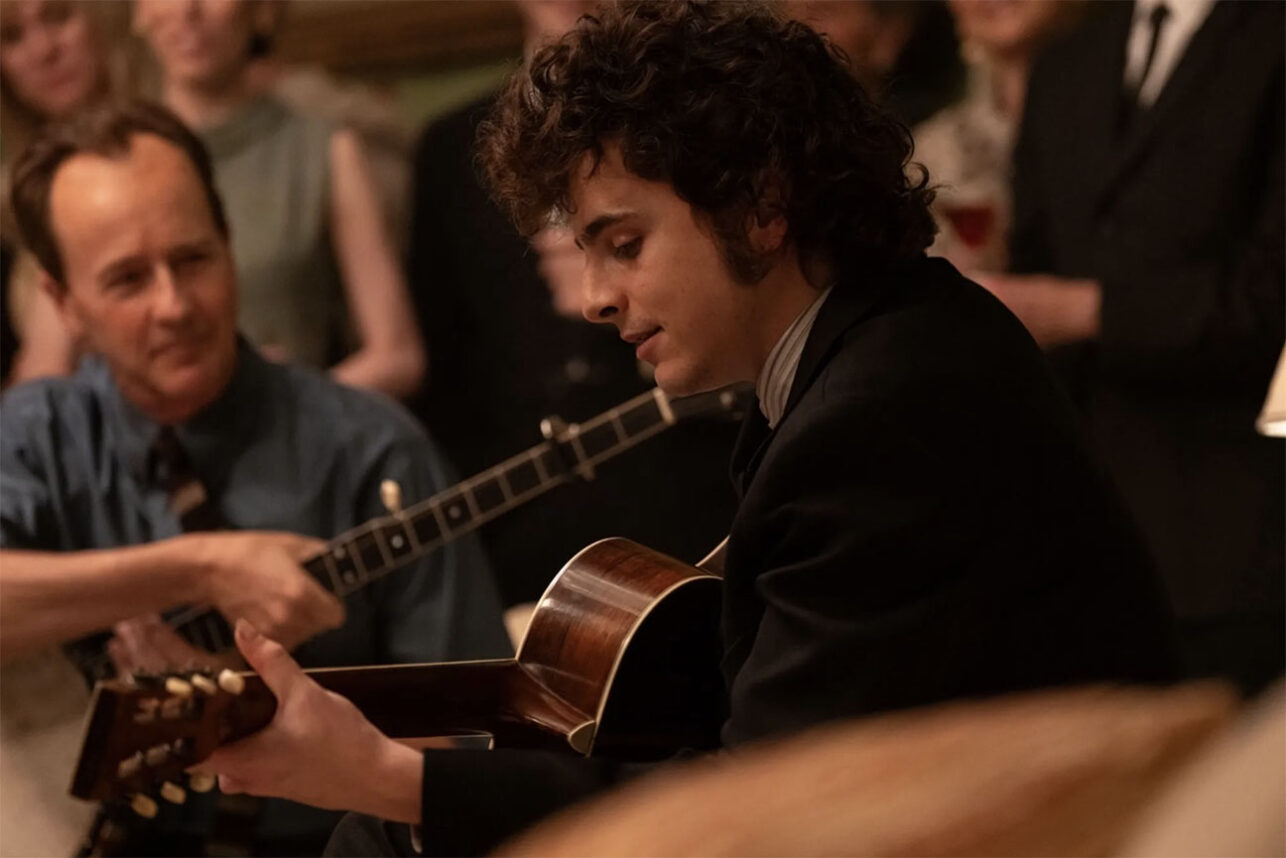Of all the many eccentrics, weirdos andself-styled geniuses of the 1960s and 1970s, Charles Ludlam, founderof The Ridiculous Theatrical Company, was the most unmistakable and,in a certain sense, the most legitimate. Weirdness and eccentricitycarried to extremes sometimes create a kind of genius — a phenomenondiscernible in cases such as Alfred Jarry, Eric Satie, Antonin Artaudand even, to an extent, Oscar Wilde. In every instance, a certainuniqueness of style is present that is inextricable from the artist’spersonality and that indelibly defines the public persona.

Tony Abatemarco and John Fleck in “The Mystery of IrmaVep.”
Combining parody, vaudeville, farce, melodrama,satire, pathos and bathos, Ludlam created a brand of camp thatthoroughly qualified him for the title of “Camp Commandant” in thatheady era that we conveniently label the Swinging ’60s, but whichactually swung right through the succeeding two decades. During thesame period, while playwrights such as Harold Pinter, N.F. Simpson,Jean Genet, Eugene Ionesco and the early Edward Albee weredelineating the concept of The Absurd, Ludlam was actively definingThe Ridiculous — which was a kind of demented, younger brother ofThe Absurd.
Using a mixture of flamboyant sexuality andwillful excess, Ludlam showed us that when you tore the inky, blackcloaks off some of the theater’s most respected tragedies, they wererevealed to be wearing polka-dot boxer shorts and garters underneath.He did this with “Camille,” in which he played Marguerite Gautier ina décolletage that unashamedly revealed his hairy chest, andas “Hedda Gabler,” in which the most constant sound effect was theastral grind of Henrik Ibsen turning in his grave.
“The Mystery of Irma Vep,” now extended at TheTiffany Theater was, next to “Camille,” his most accomplished work. Acompound made up of vampire fiction, wolf-man parodies, mummytakeoffs and Gothic horrors such as “Jane Eyre,” “Rebecca” and “TheOld Dark House,” it was first performed by Ludlam and his longtimelover, Everett Quinton, in 1984. And being a two-hander in which thesame two actors play eight different roles, it is regularly revivedin small theaters throughout the country.
The delirious duo in the current revival are TonyAbatemarco and Leland Crooke (the latter replacing John Fleck, whofirst opened the show). There are several touches of broad andover-the-top mugging in both performances, but the main source ofcomedy comes from Ludlam’s rapid shuffling between characters. Thethrill of watching quick-change artists, a convention made popular inAmerican vaudeville, is the uncanny rapidity with which one characterleaves the stage and a new one appears . Here, the changes areconstant but not exactly lightning-quick, and the characterizationsemerge more as rough charcoal sketches rather than fine-linedpen-and-ink caricatures.
The question forcibly arises in this version of”Irma Vep” as to how the demands of Ludlamesque travesty are bestserved. If plot is subordinated and the audience pelted with schtickfor their own sake, each piece of business and facial contortion hasto have enough comic point to keep us constantly amused. If thecontrived plot becomes merely a trampoline for comedians to struttheir stuff, the stuff they strut has to be comically compelling. Inthe present dispensation, it isn’t; as a result, there is a kind ofdissociation of sensibility between the subject of the parody and thedesperation of the parodists.
“Treat the material in a madly farcical manner,”Ludlam wrote in his Manifesto of the Ridiculous Theater, “withoutlosing the seriousness of the theme. Show how paradoxes arrest themind. Scare yourself a bit along the way.” Here, the theme is almostentirely sacrificed to arbitrary high-jinks, the “paradoxes” upsetrather than “arrest” the mind, and, although Abatemarco and Crookemay well “scare [themselves] along the way,” they rarely affright orsurprise us. Once the play’s quick-change mechanism is grasped, themind of the audience looks for tid-bits of comic nourishment to feedits insatiable appetite for surprise, and these are few and farbetween.
Abatemarco’s Lon Chaney-like transformation into awolf is splendidly accomplished, and his Lady Enid has severalmoments of palpitating prissiness, but, by and large, the draftgenerated by his performance comes as a result of watching the wheelsgo round.
Crooke is at a much lower velocity all the waythrough and, because of that, occasionally scores with a throwawayline or an unexpected shift from hyperbole to nonchalance. But theproblem is that Abatemarco overacts and Crooke underacts and theperformances of both men are hung on the threadbare plot line likehulking sides of beef on a fragile yo-yo string.
I found myself recalling the almost off-handcomedy of Ludlam himself when the casualness of the preposterousthings he was doing would register with the force of a hurricane. InLudlam’s universe, the absurdity of the world was like a cosmicvacuum cleaner sucking all elements of normality out from under himwhile he was trying to resist its gravitational pull. Treating theimplausible as if it were the mundane is a useful comic device andwould have been a much more effective approach than making theridiculous even more ridiculous.
The plot of “Irma Vep,” as I’ve indicated, is acat’s cradle made up of innumerable strands of film and theatricalclichés. Essentially, the play is an invitation for two actorsto overwhelm us with their energy and their versatility. Abatemarcoand Crooke certainly crank out energy but seem, to me, to lack thecomic versatility needed to make “Irma Vep” rise from pastiche tosatire.
Charles Marowitz, a regular contributor for InTheater magazine, writes from Malibu
A Guide to L.A.’s Jewish Theater
By Naomi PfeffermanEntertainment Editor
Following is a roundup of Jewish-themed playsshowing around Los Angeles:
* “A Piece of My Heart,” at the National Cemeteryin Westwood, May 22, 23 and 24, at 7:30 p.m. Shirley Lauro’s play,perhaps the first about the Vietnam War ever performed in a Veteranscemetery, focuses on the experiences of six American women inVietnam, and how the war deeply affected the rest of their lives. Theemphasis is on healing, says Richard Greene, president of the VentureWest Theatre Company. Admission is free. For directions andinformation, call (310) 364-1654.
 * “UnexpectedTenderness,” at the Marilyn Monroe Theatre/Lee Strasberg TheaterInstitute, through May 31. Israel Horovitz’s semi-autobiographicalplay centers on a 1950s New England Jewish family torn apart by arage-a-holic father. The dark comedy traces the family’s collapse andthe son’s journey toward recovery. Admission is $15 and $18. (213)650-7777.
* “UnexpectedTenderness,” at the Marilyn Monroe Theatre/Lee Strasberg TheaterInstitute, through May 31. Israel Horovitz’s semi-autobiographicalplay centers on a 1950s New England Jewish family torn apart by arage-a-holic father. The dark comedy traces the family’s collapse andthe son’s journey toward recovery. Admission is $15 and $18. (213)650-7777.
* “Gift of God,” at the actors’ playhouse in LongBeach, through May 31. Richard Freedman’s boy-meets-girl saga, whichexplores the nature of love and sacrifice, is also a riff on thestory of Abraham and Isaac. General admission to this L.A. JewishTheatre production is $15. (213) 660-8587.
* “I Am a Camera,” at The Flight Theatre at TheComplex, through June 6. Based on Christopher Isherwood’s “BerlinStories,” John Van Druten’s piece concentrates on people at thefringe of German society in 1930 — a milieu rife for the rise ofHitler. General admission is $15. (310) 296-0369.
* “Mysteries in a Silver Box,” at the Los AngelesTheatre Center, opens on May 29. Susan Rubin’s suspense-comedy,inspired by her family’s immigration experience, describes 24 tensehours in the life of an eccentric Russian-Jewish family in GreenwichVillage. When Mom disappears, two sisters are entangled in a web oflost lovers, foreign agents and family secrets. General admission is$12. (213) 485-1681.
 * “LeavingScarsdale,” at the Masquer’s Cabaret in West Hollywood, Ma
* “LeavingScarsdale,” at the Masquer’s Cabaret in West Hollywood, Ma
y 20through June 24. Nancy Levine’s autobiographical monologue tells ofcoming of age and staying sane in a family that’s grappling withmental illness. When she was 13, Levine tells us, things startedgetting really weird at home. The weirdest part was that no one inthe family would talk about it. Admission is $10, with a one-drinkminimum. (213) 653-4848.
* “Backstreet,” a musical set in aturn-of-the-century Jewish brothel, is extended through June 28 atthe Santa Monica Playhouse. Admission is $18 to $20. (310) 394-9779,ext. 1.
Left, Erica Yohn, Marya Kazakova and BarryThompson in a scene from “Unexpected Tenderness.” Right, NancyLevine, who performs her monologue “Leaving Scarsdale.”





















 More news and opinions than at a Shabbat dinner, right in your inbox.
More news and opinions than at a Shabbat dinner, right in your inbox.